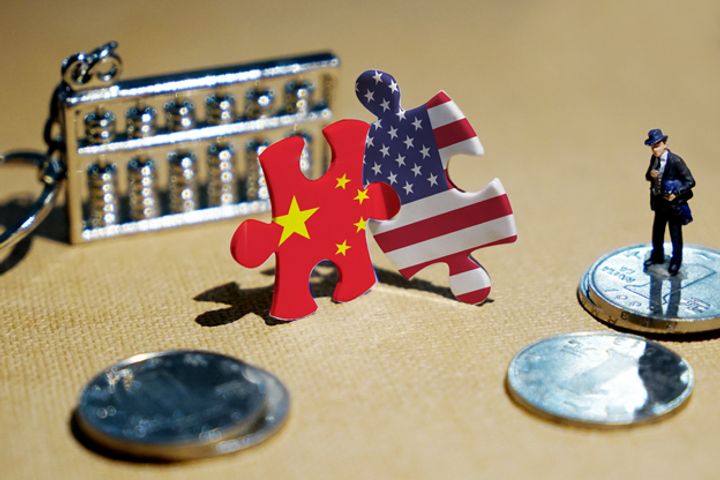 China Should Prepare for 'Epic Trade War'
China Should Prepare for 'Epic Trade War'[Yicai Global is committed to providing an open forum to air a diverse range of views. The opinions expressed herein are the author's alone. Yicai Global has redacted this article to conform to our style and usage guidelines, but neither validates its factual nor endorses its editorial content.]
(Yicai Global) March 27 -- An "epic trade war" is a term that I coined to describe the trade dispute between the United States and China and it has spread like wildfire, almost overnight, among the general public.
If we want to get the best outcome out of this, we should be both active and prudent, and neither underestimate nor overestimate the severity of the issue. Instead of hoping to resolve the trade war once and for all, we should be mentally prepared for the possibility that it will be a long-term problem.
US President Donald Trump signed a presidential memorandum on "China's economic aggression" on March 22, announcing that the States would impose punitive tariffs on about USD50 billion worth of Chinese imports in the steel, aluminum and intellectual property sectors, and restrict China's direct investment in the US.
For China, a country whose dependence on trade has ranked high among world powers for the past more than 20 years, this is undoubtedly very serious. Considering China and the US are the world's leading economies; the two countries have contributed more than 50 percent of global economic growth over the past decade; China is the biggest victim of trade protectionism and has been the main target for trade remedies for nearly 30 years; and the value of products affected by this trade war initiated by the US was a record high, I described the situation as an epic trade war, and this resonates with readers.
However, in terms of commodity types and punitive tariffs, this trade war is not the biggest in our history. Some developing countries have introduced the most extensive restriction measures on our commodities. In this trade war, the US considers imposing punitive tariffs on about 1,300 types of Chinese goods, and the total worth equates to 10 percent of China's exports to the US, according to American data.
In April 1993, Mexico took anti-dumping measures on more than 4,500 types of commodities spanning 10 categories, equal to 75 percent of China's exports to the country. The highest temporary tariff was 1,105 percent (on shoes), an unparalleled spectacle in global trade history. Mexico then became the last obstacle in our effort to join the World Trade Organization. We eventually agreed to let the nation levy special tariffs on Chinese imports till 2008 in exchange for their support in China's accession to the WTO.
This China-US trade war is a new case of the long-term trade dispute pressure that China now faces. An old Chinese saying says those who are outstanding in their fields are sure to be challenged. As long as China's economic performance remains positive, trade friction with all countries, not just the West, will be inevitable. Given China's large size and robust strength, I think it's better for China to become a target of trade friction than a target of other countries' pity, sympathy and charity. We should therefore address this trade war and believe that it is proof of China's economic achievements.
US trade frictions with China have a long history. They began shortly after the two countries established normal economic and trade relations in July 1979. In that year, the US unilaterally announced that it would impose limits on Chinese exports in seven textiles categories. In 1983, the two nations almost reached a trade war as China disagreed with a US proposal to reduce annual quotas for textile trade. The US lowered the quota and then China responded by saying it would reduce or stop the purchase of American cotton, chemical fibers and soybeans. The countries reached a new textiles agreement in September 1983, but trade frictions had already begun and are what led to the recent trade war.
There are also trade wars between China and other countries that will not come to an end in the foreseeable future.
"Uncle Sam" has been a world powerhouse for more than 70 years, and will inevitably be vigilant against emerging powers which may challenge its dominance. China is not only a major emerging economy, but also has a very different social system and cultural heritage. In the eyes of the US, China poses a huge threat and America needs to prevent its growth.
Among US presidents of the past two decades, Trump has paid the most attention to rebuilding the American real economy. His political foundation also relies on rebuilding the real economy through trade protection. He is almost like a gambler during negotiations with other countries and enjoys adopting his own Art of the Deal techniques. It would have been impossible for his predecessors to impose tariffs on USD50 billion worth of goods, and although the trade war may wind up with the two countries coming to a compromise, there will be more disputes.
In the face of a trade war, China will take countermeasures and can strike back against whoever begins the war. We cannot lose and must fight against our opponents, leveraging the trade war to achieve our objectives. The US has threatened to limit China's investment there and reduce the number of visas grnated to Chinese, which will help China rein in capital flight. Only by taking advantage of America's actions can we cope with a trade war and continue to grow.
The author is a researcher at the Chinese Academy of International Trade and Economic Cooperation under the Ministry of Commerce.